Archived Content
In an effort to keep ICE.gov current, the archive contains content from a previous administration or is otherwise outdated. This information is archived and not reflective of current practice.
ICE Women's History Month spotlight
Women's History Month is an annual declared month that highlights the contributions of women to events in history and contemporary society. It is celebrated during March, corresponding with International Women's Day on March 8.
2016
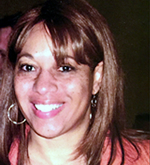 U.S. Immigration and Customs Enforcement’s (ICE) Homeland Security Investigations (HSI) New Orleans Deputy Special Agent in Charge (DSAC) Cindy Johnson believes that diversity in the work place is very important.
U.S. Immigration and Customs Enforcement’s (ICE) Homeland Security Investigations (HSI) New Orleans Deputy Special Agent in Charge (DSAC) Cindy Johnson believes that diversity in the work place is very important.
She recently attended a training session developed by ICE’s Office of Diversity and Civil Rights called the Simon Wiesenthal Center’s Museum of Tolerance’s “Cultural Diversity for Law Enforcement,” which provided her with insight and valuable tools to help increase the effectiveness of community engagement and to continue to lead in a way that makes ICE an inclusive workplace.
“I believe there are many fundamental elements in being a good leader but there are three vital characteristics – humility, generosity and vulnerability,” Johnson said. “Vulnerability means being comfortable with letting your troops know that you don’t know it all but can find out and that you are open to listening to all ideas to ensure employee empowerment.”
According to Johnson, Women’s History Month recognizes the advancements women have made over the years to become accepted in workplaces that have lacked inclusion. With the challenges many women face specifically in law enforcement, she feels fortunate to work in a place that is aware of the contributions of women and truly appreciate them and she loves her job.
Alongside HSI New Orleans Special Agent in Charge Ray Parmer, Johnson oversees the HSI New Orleans area of responsibility, which encompasses 25 offices covering 13 federal judicial districts throughout the states of Alabama, Arkansas, Louisiana, Mississippi and Tennessee.
Johnson, a native of Detroit, Michigan, is a U.S. Army veteran with 22 years of federal law enforcement experience. Her previous supervisory assignments include serving as the deputy director of the Reporting Coordination Center and as special assistant to the ICE Director of Operations in Washington, D.C., and as an assistant special agent in charge in New Orleans, as well as a number of leadership positions at HSI headquarters, including serving as a member of the transition team tasked with standing up the Department of Homeland Security in 2003.
One of the most important roles of Johnson’s career came during her days in SAC San Diego specifically RAC San Ysidro where she was a proud border rat working proactive and reactive cases while training new agents as they began their assignments.
“I never in a million years thought that my career would elevate to the DSAC level and I am forever grateful for this opportunity. The senior management of ICE and HSI have consistently demonstrated their confidence in me especially SAC Parmer,” Johnson said. “My father taught me at an early age that dedication and hard work prevails. He also taught me the importance of mentoring to help others during their journey. Hopefully, I can continue to help others along their journey as well.”
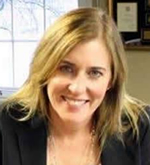 Detroit means everything to Rebecca Adducci.
Detroit means everything to Rebecca Adducci.
She was born and raised there, spending a majority of her childhood on the city’s southwest side before moving to the nearby suburb of Rochester Hills.
When it came time to go to college, she didn’t go far, opting to attend Michigan State University in East Lansing, Michigan, a short 90-minute drive from her hometown. It was there when she became involved in the criminal justice program, that her interest in law enforcement blossomed.
“I didn’t know what I wanted to do at 17 and 18,” Adducci recalled. “I decided to take an Intro to Criminal Justice class and there was an IRS agent who came in to speak to the class and I thought it was a cool job to be an agent with the IRS.”
That class sparked the beginning of a law enforcement career that started with an internship with the state police in Pontiac, Michigan, and has grown more than 28 years to her current role as Field Office Director (FOD) for U.S. Immigration and Customs Enforcement’s (ICE) Enforcement and Removal Operations (ERO) Detroit office.
For Adducci, who now oversees an area of responsibility that includes the states of Michigan and Ohio, the chance for her life and career to come full circle and work in a place that holds such sentimental value was a once-in-a-lifetime opportunity. In a field where you often have to move from location to location, setting up roots in one area, especially your hometown, allows for consistency and dedication.
“I’m sitting in the same building that I did when I started as a special agent in 1987,” Adducci said. “My grandparents were born here. My parents were born here. I can’t imagine how having that rooted relationship [to the area] can be detrimental.”
As Adducci reflects on Women’s History Month, she immediately thinks of her mother who was a nurse for 42 years. In an era in the 1960s when women earning advanced degrees wasn’t as common as it is today, Adducci saw her mother pursue and earn a master’s degree. While she admits nursing was never “her thing,” Adducci has seen many women, including herself, make advancements that were unheard of in her mother’s generation.
Adducci also acknowledges the support and encouragement she has received from the men who have touched her life, from her father to her husband to her Deputy, Mark Pilat, who has been a friend and colleague since her initial academy. “The occupational venue of law enforcement is a unique challenge for women, given the predominantly high populous of men in this vocation. I feel great pride to have earned the respect and confidence of my male subordinates, colleagues and associates.”
Adducci has been fortunate to be able to make her contribution in her own community. There have been times when she’s considered leaving, but no opportunity has been good enough to make her leave a job she loves and an area she calls home.
“I’m from the school of ‘if it ain’t broke, don’t fix it,’” Adducci said. “Having the emotional ties to the area has made me better at my job.”
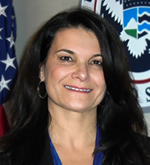 U.S. Immigration and Customs Enforcement's (ICE) Enforcement and Removal Operations (ERO) Seattle Field Office Director (FOD) Nathalie Asher is constantly reminding her two daughters about how the landscape continues to evolve for women.
U.S. Immigration and Customs Enforcement's (ICE) Enforcement and Removal Operations (ERO) Seattle Field Office Director (FOD) Nathalie Asher is constantly reminding her two daughters about how the landscape continues to evolve for women.
After all, she's seen those changes first-hand. With a career in law enforcement that spans more than 20 years, Asher has been able to be a part of and witness the advancement of women in society and the increased acceptance in the workplace.
She wants to make sure her own daughters, as well as other women, recognize the limitless possibilities for their lives and careers and pursue whatever their interests may be.
Asher oversees an area of responsibility that includes that states of Alaska, Washington and Oregon. In 1996, she joined the former Immigration and Naturalization Service in Seattle as an intelligence research specialist. From 1998 through 2005, she served as a deportation officer at the Seattle field office and the Northwest Detention Center in Tacoma, Washington. In September 2005, she became a supervisory detention and deportation officer and was promoted two years later to assistant field office director.
It's been a unique path to reach this point, as she's had experiences ranging from spending summers in France as a little girl with her grandmother to serving as a Russian linguist for the U.S. Army. Nonetheless, when Asher was promoted to FOD in 2010, it was a role she was prepared for years ago when her now-retired military dad gave her words of wisdom that stuck with her since her days growing up as a military brat.
"He taught my two sisters and me that there were no limitations in our goal setting and the expectation was that we would always apply ourselves and celebrate that we are women pursuing a career track like anyone else," Asher said. "My dad told us that unfortunately there will be times when we will have to work that much harder to earn the same level of credibility that the guy next to you is walking in with, but nevertheless to stand tall, be the best you can be and the rest takes care of itself."
According to Asher, moving up in the ranks and ultimately becoming a FOD was never in her career plans. She credits her energy to do a good job, her passion for the well-being of her troops and the legacy of women senior leaders as mentors before her as factors that ultimately opened the door to the positions she feels fortunate to have received.
Every now and then, when Asher's just going about her daily tasks and doing her job, she receives notes and emails from junior female colleagues expressing their appreciation for the job she does and what she represents. It serves as a reminder of the responsibility that comes with being a woman in leadership. It's a responsibility that she doesn't take lightly.
"For me, it's one of the most important facets of my position," Asher said. "So much of the role that I'm in now is about setting the example in how I carry myself and how I engage in this ever-changing environment. I remind myself that these young women are looking up to me and I take that very seriously."
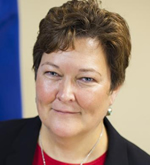 Not a day goes by that U.S. Immigration and Customs Enforcement's (ICE) Homeland Security Investigations (HSI) Dallas Special Agent in Charge (SAC) Katrina Berger doesn't take a moment to sit back in awe of where life has taken her.
Not a day goes by that U.S. Immigration and Customs Enforcement's (ICE) Homeland Security Investigations (HSI) Dallas Special Agent in Charge (SAC) Katrina Berger doesn't take a moment to sit back in awe of where life has taken her.
After all, she grew up in a small, working-class town in Southern Delaware where she spent her summers helping her mother clean beach rental properties along Bethany Beach. Now, after nearly 20 years in law enforcement, she oversees an area of responsibility that includes seven offices in 128 counties in North Texas and the entire state of Oklahoma.
As Berger reflects on Women's History Month and this year's theme: "Working to Form a More Perfect Union: Honoring Women in Public Service and Government," she knows her own career in government would not have reached the point it has if not for the work ethic her mother instilled in her at an early age.
"She was never afraid to get out there and work, and I think I learned that from her," Berger said. "She encouraged me and was there for me. If there was something I wanted to do, she and my father always told me ‘you can do whatever you put your mind to.'"
That thinking stayed with Berger as she attended law school and began her career as an attorney, eventually working her way up to assistant attorney general with the Florida Office of the Attorney General in Tampa, Florida. While she enjoyed her job, Berger always maintained an interest in the investigative side of law. At the urging of law enforcement counterparts she'd worked with in court, Berger applied to the federal government and began her federal law enforcement career as a special agent with the U.S. Customs Service in Tampa in 1998. That jump started a second career that would include several leadership roles at ICE including Deputy Assistant Director of HSI Domestic Operations, Chief of Staff of the ICE Deputy Director and ICE Deputy Director of the Organized Crime Drug Enforcement Task Force Fusion Center.
According to Berger, her willingness to be fluid in her career and move around has been beneficial to her advancement.
"A lot of people aren't willing to move. They want to hunker down and stay in place," Berger said. "I've not always taken the easy route. I've been asked to take positions that weren't the most sought-after roles, but I took them and they presented great opportunities and learning experiences for me."
As a woman in leadership at ICE, and understanding the challenges many women face in law enforcement, Berger feels she has a responsibility to her junior colleagues to serve as a mentor. In doing so, she makes sure she is leading by example. Part of that exemplary leadership includes the collaboration that takes place in her own office. Dallas is unique as it's the only area of the country within ICE to have all women in the SAC, deputy special agent in charge (DSAC), field office director (FOD) and deputy field office director (DFOD) roles.
"Everyone is often so surprised that [DSAC Kathy Greer and I] get along so well. We both find it entertaining that people think that two women can't work together," Berger said. "[Dallas FOD] Simona Flores and I have a lot of the same work ethics and philosophies. We are able to do really good things together in our Dallas AORs."
The work Berger is able to do every day comes as a result of a philosophy she's tried to live by, and hopes to pass on to others.
"Don't be afraid to take advantage of the opportunities that are presented to you," Berger said. "Get involved with things going on in your office because leadership notices who takes on those additional responsibilities. If you do so, you'll go far in your career."
2015
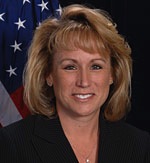 U.S. Immigration and Customs Enforcement's (ICE) Homeland Security Investigations (HSI) Assistant Director for Investigative Programs Traci Lembke has been in and around the federal government her entire life. It's all she's known.
U.S. Immigration and Customs Enforcement's (ICE) Homeland Security Investigations (HSI) Assistant Director for Investigative Programs Traci Lembke has been in and around the federal government her entire life. It's all she's known.
That journey began as a little girl in Colorado where she and her two brothers were raised by a single mother who worked on a GS-3 salary for the Department of Health and Human Services.
As she reflects on Women's History Month, Lembke recalls watching and learning from her mother, who she describes as a strong woman, as well as her grandmother and great-grandmother. Looking back on those lessons she learned makes her appreciate the sacrifices and struggles many women have had to face.
Lembke is one of few employees who have been with ICE, at the Headquarters level, since its beginning. In her current role, she is responsible for strategic planning, national policy implementation and the development and execution of operational initiatives spanning major investigative program divisions within HSI.
It is a culmination of over 28 years that has taken her from Denver, where she was the first female agent at age 22, to Nogales, Arizona, where she spent 10 years as a special agent, to Washington, D.C. where she has served in numerous leadership positions.
Her career path through law enforcement was been a journey that didn't see a lot of women along the way in the ranks. As a result, finding female role models was difficult. According to Lembke, the woman who had the most influence on her professionally was former HSI Director Marcy Forman.
"Marcy really did carve a path for women in law enforcement," Lembke said. "Her style was a little different than mine, but it was a style that was reflective of what needed to take place during that period of time."
Knowing that female role models are hard to find in the law enforcement profession, Lembke tries to reach back and mentor women leaders that are coming up through the ranks to help them obtain their goals.
"The first thing I usually talk to the gals about is being willing to step up," Lembke said. "If you're leading with your gender, that's a mistake."
Lembke describes her career as being "blessed". She is fortunate in part due to the fact that, in a male-dominated profession, where women often face many challenges, she has largely gone through her career without any incidents of sexism or discrimination.
"I've worked with some really smart guys who recognized early on that I bring something valuable to the table," Lembke said. "I've never once felt that I wasn't included, welcomed or supported by my male colleagues. The challenges I face every day are the same as any man in this job."
Now, for the first time in her professional life, Lembke is about to experience life outside of the federal government. Having accepted a job in the private sector, she'll be retiring in April and starting the next phase in her life. This new opportunity, like many others she's been fortunate enough to have, has come as a result of the great work she's done in her current position and her willingness to move around and take on different roles.
There will be a transition adjustment for sure, however, she's excited about the next chapter and satisfied with what she's done here at ICE.
"I believe that the legacy I will leave behind is the fact that I've always been consistent in my decisions," Lembke said. "Every decision I've made has been rooted in doing what's best for the agency. As hard as that is to do when you are dealing with people, you always have to remember that the mission comes first."
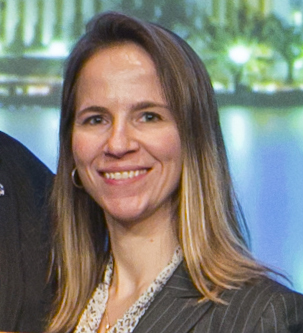 On any given afternoon, Jennifer Fenton can be found checking her numerous emails, answering the phone and running in and out of her office, all seemingly at the same time. As the chief of staff to U.S. Immigration and Customs Enforcement (ICE) Deputy Director Dan Ragsdale, her job is never done; it requires a keen attention to detail, focus and of course, a lot of energy.
On any given afternoon, Jennifer Fenton can be found checking her numerous emails, answering the phone and running in and out of her office, all seemingly at the same time. As the chief of staff to U.S. Immigration and Customs Enforcement (ICE) Deputy Director Dan Ragsdale, her job is never done; it requires a keen attention to detail, focus and of course, a lot of energy.
Anyone with those responsibilities would be perfectly fine just relaxing and catching up on rest when they are away from the office. Not Fenton and the bruises on her arms tell you why. Fenton is an avid practitioner of martial arts. When not glued to her blackberry she practices kung fu at a Spring Hill RECenter in McLean, Virginia, where she is a senior student, with a black sash – the highest rank. And like at ICE, she finds herself in a school comprised mostly of men.
"There are only four women with black sashes in the school, and we don't get treated any differently," Fenton said. "When we are [fighting], what you have to compensate for is weight and height, not gender."
As an only child, Fenton followed in the footsteps of her parents, both of whom spent at least a portion of their careers working for the federal government. Of female role models, her mother ranks highest, and some of her mother's experiences – both personal and professional – are illustrative of some of the challenges many women face in the workplace.
"While not indicative of her abilities, her opportunities were substantially limited by her associate's degree," Fenton said. "What I found, as a lawyer, was that I received more opportunities than she has ever been given, over the course of her 43 year career. When I started in the government, I was given a pay grade that took her at least 25 years to obtain."
A graduate of George Mason University and the University of Virginia School of Law, Fenton has been with ICE for more than eight years. In her current role, she is responsible for the day-to-day operations of the Office of the Deputy Director. As a woman in leadership at ICE, she's well aware of her surroundings in an agency staffed largely by men but has never had any issues or experienced any distinction here at ICE.
Fenton doesn't expect to be treated any differently because of gender. She attributes her perspective to her positive, albeit unconventional, experiences as a young girl, having been practically raised in a naval bar, where she waited with her dad for her mom to get off of work. The lessons learned from those experiences remain with her.
Likewise, Fenton does not believe in treating others any differently because of their gender. "We all have something unique to contribute to the proverbial conversation," she said. "But, my standards and expectations are no different for the men and women that work for me. Their professional capabilities are not predicated upon their gender." Those expectations include finding time to break away from the grind, just as she does with martial arts. It's a piece of advice she always makes sure to share with those she works with at ICE.
"You have to work hard and play hard," Fenton said. "There is a place for stepping out, decompressing and making time to pay attention to you."
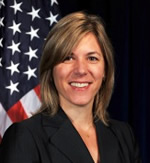 Twenty years ago, Tracey Bardorf was fresh out of college and working as a waitress at a Hyatt resort in Arizona. Like many at that age, she was in the stage of life where she was just trying to figure out what was next and wasn't sure where her career would take her. Never in her wildest dreams would she have thought that - 20 years later - she would be sitting in an office as U.S. Immigration and Customs Enforcement's (ICE) Assistant Director for the Office of Policy.
Twenty years ago, Tracey Bardorf was fresh out of college and working as a waitress at a Hyatt resort in Arizona. Like many at that age, she was in the stage of life where she was just trying to figure out what was next and wasn't sure where her career would take her. Never in her wildest dreams would she have thought that - 20 years later - she would be sitting in an office as U.S. Immigration and Customs Enforcement's (ICE) Assistant Director for the Office of Policy.
"I got out of school [at Saint Anselm College in Manchester, New Hampshire] and I had a degree in Spanish literature with very high marks which means you're entirely unemployable," said a laughing Bardorf who, on a whim, decided to take the LSAT and ultimately entered law school at Arizona State University. "Being at this point was never on my radar, not at all. I had no thought of being a lawyer and I never thought I'd live in D.C."
It's been a long journey of countless opportunities that began in her home state of New Hampshire. It was there that the foundation was laid by her family for Bardorf to be a strong woman in life. She recalls her parents never treating the girls and the boys differently, teaching all of them that they could do whatever we wanted to do in life.
When it came to role models, it started with both grandmothers, who were born in the 1910s to immigrant parents. Each was single mothers who had to work to support their respective families.
That aggressive nature and go-getter mentally helped Bardorf rise in the ranks to her current role where she leads ICE's efforts to identify, develop and effectively communicate the agency's priorities and policies. Prior to her current role, she served in ICE's Office of the Director as special advisor to former ICE director John Morton working on international strategy and policy and ICE's engagement with Mexico.
The opportunities she's had with ICE follow stints with the Department of Justice and tenure as an assistant U.S. Attorney in Phoenix – a position Bardorf describes as her "dream job."
"A lot of opportunities will come when you're doing well and enjoying yourself," Bardorf said. "People will come knocking with opportunities that you may not have thought about."
The result of having a successful career puts one in a position of admiration among peers and with that comes a responsibility to give back. According to Bardorf, people naturally look up to those who are further along in their career and it's important to remember that you're setting an example for others
"It is very important for me to remember that the younger women are looking me and saying ‘I want to be an AD one day or I want to move up from where I am,'" Bardorf said. "You have to be a good role model and give them a good example to see that they can not only move up, but be successful when they get there."
Over the last five years she's been with ICE, Bardorf has succeeded simply by being herself. And despite being in a male-dominated environment, having shown that she possesses the skills to successfully do a job has presented numerous opportunities, no matter her gender.
Even though she's ultimately found herself in a place she never imagined.
"You could've offered me this current job back when I was waitressing and didn't want to be waitressing anymore and I would've said ‘no way, I don't want to live in D.C. I don't want to work in an office or in the big bureaucracy. None of that would've appealed to me,'" Bardorf said. "Now, I think it's a pretty fun job. You have no conception [when you're younger] of what's out there and the interesting things you can get involved in. D.C. can be very fun. It's been an eye-opener."
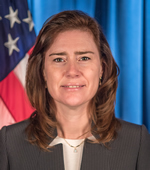 When U.S. Immigration and Customs Enforcement's (ICE) Homeland Security Investigations (HSI) Office of Intelligence Assistant Director Patricia Cogswell was asked in ICE Director Sarah Saldana's introduction meeting to describe something unique about her, she knew exactly what to share.
When U.S. Immigration and Customs Enforcement's (ICE) Homeland Security Investigations (HSI) Office of Intelligence Assistant Director Patricia Cogswell was asked in ICE Director Sarah Saldana's introduction meeting to describe something unique about her, she knew exactly what to share.
"I said I'm a sci-fi junkie,'" Cogswell revealed with a laugh. "On any given weekend, you can catch me at a Marvel Comics 3-D IMAX action flick, reading a ‘Star Trek' novel, or watching a ‘Doctor Who' episode on TV."
It's how Cogswell disconnects from her day-to-day duties at ICE where she serves as ICE's Key Intelligence Officer. Cogswell joined ICE 11 months ago after serving in various capacities in the Department of Homeland Security, and at the National Security Council (White House) as the Special Assistant to the President for Homeland Security and Senior Director for Transborder Security Policy.
She notes that the opportunities she's been afforded, since starting as a GS-3 summer intern in 1988, reflect how far we've come as society and how much things have changed in comparison to what many women experienced a generation before Cogswell.
Throughout her career, starting when she majored in mathematics at the University of Pennsylvania to earning her Juris Doctor from the College of William and Mary, to her service at the Department of Justice, DHS Headquarters, the National Security Council and ultimately with ICE, Cogswell has often found herself in situations where she was the only woman in the room – or one of a very few. In all those instances, she has made the best of it, seeing it as an opportunity to break new ground.
She's also appreciative of how much help and support she's had on the way. "I understand how intimidating it can be, especially early in your career, to be in an environment where there are very few role models or people you can easily see yourself in," noted Cogswell. "I've been very fortunate that in those situations, I've had supportive male family members, colleagues, and mentors who supported me."
As a woman in leadership, Cogswell feels there's an important responsibility to better train the next generation of leaders. Over the years, Cogswell has given a lot of career advice to other women as they come up the ranks. The No. 1 point she stresses is to know yourself, to know what you enjoy doing, and not to be afraid to try something different or outside your comfort zone.
"Sometimes it's almost just as important to find out what you don't like as much as what you do," Cogswell said.
Cogswell has followed that advice as she has worked in several different fields over the course of her career. She describes her current work in law enforcement intelligence as her second career following years in policy. It's one that she finds satisfaction in and hopes to be involved in for the foreseeable future.
"I think what we do in government can make an important difference in people's lives," Cogswell said. "I like being in role where I can focus on getting things done."


